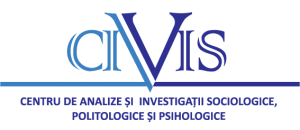CIVIS – Centru de analiză şi investigaţii sociologice, politologice şi psihologice
Study of social, economic and political phenomena and processes;
KAP studies – identification and analysis of knowledge, attitudes and practices of target groups towards various social, economic and political phenomena and processes;
Public opinion studies towards various social, economic and political phenomena and processes;
Monitoring and assessment of programmes, projects, activities;
Base-line survey – study of situation prior to implementation of development programmes / projects;
Impact studies;
Monitoring of the intonation, broadcast time, and publicity spots in electoral campaign;
Monitoring of programme lists;
Study of phenomena’ and processes’ dynamic and trends;
Comparative studies;
Analysis of statistical data and secondary information;
market studying (volume, structure, trends, main players etc.)
Product usage and attitudes (U&A);
Information about consumer habits and behaviour related to the product / group of products;
Product, concept, pack and price test/market launch;
Best product choice / current product upgrade;
Marketing strategies;
Continuous tracking of specific market segments, trends and market changes;
Retail product availability and price monitoring;
Analysis of statistical data/secondary information;
Regular monitoring of your brand and competitor brands indicators;
Regular ad efficiency monitoring;
Ad satisfaction monitoring;
Identification of the strongest and most memorable/weakest and most irritating ad elements.
Campaign is an organized and coordinated process of persuasion, directed directly to the public opinion and behaviour, aiming to get a well defined set of objectives. The information campaign can be initiated by a large variety of institutions, groups or even individuals that are looking for satisfaction of particular interests
Qualitative researches: aims at obtaining information on certain topics from a small number of subjects. Qualitative research – under the form of focus group discussion, in-depth interview, observations or unexpected approach of certain categories of subjects – can be used in order to find out new ideas in communication messages and test them, to draft quantitative questionnaires and to assess certain programs. It is important to know that qualitative studies would allow making general conclusions about large segments of the population.
Basic methods:
Focus group discussions
In-depth interviews
Quantitative researches: aims at obtaining objective information from representative samples (national, local and regional) of subjects. The quantitative research is used in order to gain certain conclusions, which can be related numerically to the target population.
Basic methods:
Quantitative survey:
at the national level
at regional / local level
face-to-face
by phone/CATI – Computer Assisted Telephone Interview
on-line
Omnibus researches. Omnibus (multi-purpose) studies constitute one of the oldest methods of custom market research – that of surveying representative population samples at regular intervals. The distinct advantage this method offers is that clients from very different business sectors (hence “multi-purpose”) are able to come together in a study with their own individual questionnaires but sharing the fixed costs – which are the major portion of a study´s overall costs. Based on a large sample, the results are extremely reliable and provide ad-hoc quality that is exclusive and economically priced.
New respondents are chosen for every omnibus study and the data are therefore free from “panel effects”, where results might be influenced by respondents being surveyed too often.
Analysis of secondary information;
Elaboration of methodology (appropriate methods to be used, sampling etc.) and research tools (questionnaire, in-depth interview or focus group discussion guideline, observation forms etc.;)
Preliminary testing and finalization of research tools;
Multiplication of tools, contacting and training of fieldwork interviewers / recruiters;
Field work – data collection;
Checking of field work quality;
Data entry;
Linear statistical and qualitative processing of information;
Multi-linear statistical processing of information by socio-demographic profile of target group (for quantitative studies);
Elaboration of analytical report (Word or Power Point format) based on collected information;
Graphical presentation of main findings.
